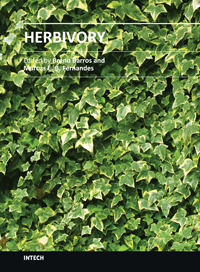
Edited by Breno Barros and Marcus E. B. Fernandes, ISBN 978-953-51-1052-1, 86 pages, Publisher: InTech, Chapters published February 27, 2013 under CC BY 3.0 license
DOI: 10.5772/2718
Studies of herbivory provide important insights into fundamental questions in many areas of the biological sciences. The focus on natural systems is more effective for the prediction of potential changes in ecosystems, given that agricultural systems are designed to create an equilibrium that optimizes the productive process. Given the ramifications of the processes related to herbivory, studies based on complementary approaches are necessary for a better understanding of the different aspects of the ecological process. This book attempts to expand on these different aspects of herbivory by presenting a multidisciplinary approach to a number of different themes, focusing on topics that range from basic research in natural habitats to the intrinsic relationships between animals and plants in agricultural systems.
Chapter 1  Woody Plant-Herbivore Interactions in Semi-Arid Savanna Ecosystemsby Allan Sebata
Woody Plant-Herbivore Interactions in Semi-Arid Savanna Ecosystemsby Allan Sebata
 Woody Plant-Herbivore Interactions in Semi-Arid Savanna Ecosystemsby Allan Sebata
Woody Plant-Herbivore Interactions in Semi-Arid Savanna Ecosystemsby Allan Sebata
Chapter 2  Are the Species of the Genus Avicennia L. (Acanthaceae) a “Superhost” Plants of Gall-Inducing Arthropods in Mangrove Forests?by Rita de Cassia Oliveira dos Santos, Marcus Emanuel Barroncas Fernandes and Marlucia Bonifácio Martins
Are the Species of the Genus Avicennia L. (Acanthaceae) a “Superhost” Plants of Gall-Inducing Arthropods in Mangrove Forests?by Rita de Cassia Oliveira dos Santos, Marcus Emanuel Barroncas Fernandes and Marlucia Bonifácio Martins
 Are the Species of the Genus Avicennia L. (Acanthaceae) a “Superhost” Plants of Gall-Inducing Arthropods in Mangrove Forests?by Rita de Cassia Oliveira dos Santos, Marcus Emanuel Barroncas Fernandes and Marlucia Bonifácio Martins
Are the Species of the Genus Avicennia L. (Acanthaceae) a “Superhost” Plants of Gall-Inducing Arthropods in Mangrove Forests?by Rita de Cassia Oliveira dos Santos, Marcus Emanuel Barroncas Fernandes and Marlucia Bonifácio Martins
Chapter 3  Are Ephippid Fish a “Sleeping Functional Group”? – Herbivory Habits by Four Ephippidae Species Based on Stomach Contents Analysisby Breno Barros, Yoichi Sakai, Hiroaki Hashimoto, Kenji Gushima, Yrlan Oliveira, Fernando Araújo Abrunhosa and Marcelo Vallinoto
Are Ephippid Fish a “Sleeping Functional Group”? – Herbivory Habits by Four Ephippidae Species Based on Stomach Contents Analysisby Breno Barros, Yoichi Sakai, Hiroaki Hashimoto, Kenji Gushima, Yrlan Oliveira, Fernando Araújo Abrunhosa and Marcelo Vallinoto
 Are Ephippid Fish a “Sleeping Functional Group”? – Herbivory Habits by Four Ephippidae Species Based on Stomach Contents Analysisby Breno Barros, Yoichi Sakai, Hiroaki Hashimoto, Kenji Gushima, Yrlan Oliveira, Fernando Araújo Abrunhosa and Marcelo Vallinoto
Are Ephippid Fish a “Sleeping Functional Group”? – Herbivory Habits by Four Ephippidae Species Based on Stomach Contents Analysisby Breno Barros, Yoichi Sakai, Hiroaki Hashimoto, Kenji Gushima, Yrlan Oliveira, Fernando Araújo Abrunhosa and Marcelo Vallinoto
Chapter 4  The Study of Herbivory and Plant Resistance in Natural and Agricultural Ecosystemsby Michael J. Stout
The Study of Herbivory and Plant Resistance in Natural and Agricultural Ecosystemsby Michael J. Stout
 The Study of Herbivory and Plant Resistance in Natural and Agricultural Ecosystemsby Michael J. Stout
The Study of Herbivory and Plant Resistance in Natural and Agricultural Ecosystemsby Michael J. Stout
Chapter 5  Planned Herbivory in the Management of Wildfire Fuelsby Roger S. Ingram, Morgan P. Doran and Glenn Nader
Planned Herbivory in the Management of Wildfire Fuelsby Roger S. Ingram, Morgan P. Doran and Glenn Nader
 Planned Herbivory in the Management of Wildfire Fuelsby Roger S. Ingram, Morgan P. Doran and Glenn Nader
Planned Herbivory in the Management of Wildfire Fuelsby Roger S. Ingram, Morgan P. Doran and Glenn Nader
Link:
Nenhum comentário:
Postar um comentário